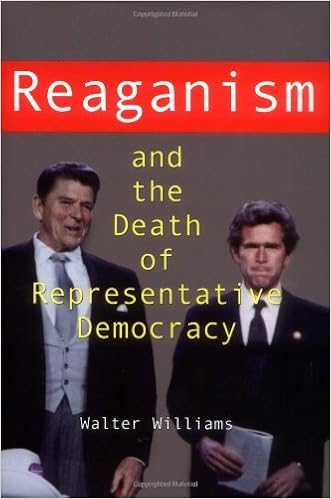
Ronald Reagan’s presidential politics and policies continue to exert a strong and, according to the author, negative impact on the economy. Williams, a retired professor of public affairs at the University of Washington and the author of Mismanaging America: The Rise of the Anti-Analytic Presidency, says that Reagan blamed the sluggish economy he inherited from President Jimmy Carter on an unresponsive federal government, high taxes, and excessive regulation of business. Reagan responded by reducing funding for the agencies needed to run the federal government, which slowed their effectiveness and thereby helped make the government as unresponsive as he believed it was. In addition, he successfully advocated a regressive tax structure that favored the rich and aggressively promoted business deregulation.
Reaganism, the continuation of Reagan’s policies by Presidents George H.W. Bush, William Clinton, and George W. Bush, has become a “meaner Reaganism” characterized by polarized politics, fewer citizens voting and wanting to participate in politics, and business scandals including the savings and loans fiasco of the 1980s and Enron. Williams rebukes the current President Bush for selling his enormous tax cut to the public based on distorted economic projections—similar to the way Reagan sold his “supply-side economics” budgets. Bush assumed that a large federal budget surplus would allow him to cut taxes, even after the surplus was turned into a deficit by the war in Iraq and the War on Terrorism.
Although Bush is blamed for this bad faith sales pitch, Williams holds the Democrats accountable for their “cowardly and inept” challenge to Bush. In addition, the Senate and the House, beginning with largely right-wing conservative class of 1994, no longer operate with a spirit of bi-partisanship. Winner-take-all victories have largely replaced the compromises needed to pass legislation that benefits the majority of citizens.
Williams marshals an impressive array of statistics and convincingly presents this bleak assessment of the Reagan legacy. He concludes that the United States has become an “early stage plutocracy,” in which elected officials pay more attention to wealthy corporate donors than to the needs of its citizens. Until voters hold their elected officials accountable for the country’s policies and until the tax structure is changed into a system that no longer favors the small percentage of wealthy at the expense of the poor and middle class, Williams asserts, the Democratic system is in danger of being overwhelmed. Budget deficits, minimal domestic spending, and corrupt business practices—this would be the worst legacy of the Reagan years.
No comments:
Post a Comment